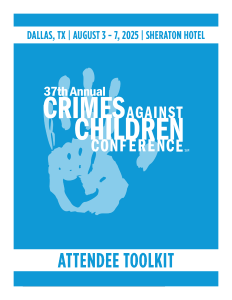Workshop
Sheraton Hotel - 2nd Floor
Beyond Prison: How Civil Commitment Protects Communities
Tuesday, August 5, 2025
12:00 PM – 1:15 PM CT
Location: Austin 1
Earn 1.25 Credit Hours
Target Audience: Law Enforcement, Prosecutor, Probation/Parole, Victim Advocate, Forensic Interviewer, Therapist
- EB
Ed Bull
Deputy Attorney General
Iowa Attorney's General Office - CT
Cory Turner
Division Director - State-Operated Specialty Care
Iowa Department of Health and Human Services (HHS)
Primary Presenter(s)
Co-Presenter(s)
How do we keep communities safe from high-risk sexual offenders after they serve their prison sentences? This session explores Iowa’s Civil Commitment Unit for Sexual Offenders (CCUSO) and its role in managing sexually violent predators who pose an ongoing public safety risk. As part of Iowa’s broader commitment to protecting children and communities, we will discuss the legal foundation of civil commitment, including the Sexually Violent Predators Act, commitment criteria, and key differences between imprisonment and civil commitment.
Attendees will gain insights into risk assessments, the five-phase treatment model, and evaluation criteria for potential reintegration. We will examine legal and ethical considerations, including Iowa Supreme Court rulings, balancing individual rights with public safety, and public perceptions of civil commitment.
Through case studies and data analysis, this session highlights the impact of civil commitment on law enforcement, victims, and communities. Attendees will leave with a clearer understanding of how prosecutors, agencies, and policymakers collaborate to enhance public safety while ensuring due process. The session concludes with an interactive Q&A to address misconceptions and discuss solutions.
Attendees will gain insights into risk assessments, the five-phase treatment model, and evaluation criteria for potential reintegration. We will examine legal and ethical considerations, including Iowa Supreme Court rulings, balancing individual rights with public safety, and public perceptions of civil commitment.
Through case studies and data analysis, this session highlights the impact of civil commitment on law enforcement, victims, and communities. Attendees will leave with a clearer understanding of how prosecutors, agencies, and policymakers collaborate to enhance public safety while ensuring due process. The session concludes with an interactive Q&A to address misconceptions and discuss solutions.
Learning Objectives:
- Describe the legal framework of civil commitment, including the Sexually Violent Predators Act, commitment criteria, and key differences between imprisonment and civil commitment.
- Assess how the five-phase treatment model and risk evaluation process determine whether individuals can be safely reintegrated into society.
- Analyze the impact of civil commitment on public safety, legal considerations, and community perceptions through case studies and data-driven insights.

